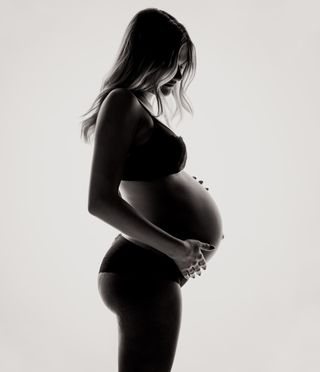Pregnancy
Is It Safe to Take Benzodiazepines During Pregnancy?
New research examines the postnatal effects of benzodiazines and z-hypnotics.
Posted June 25, 2019 Reviewed by Abigail Fagan

It is not uncommon for women to experience anxiety during pregnancy. By some estimates, up to 15% of expecting moms suffer from anxiety and its related issues. But how should it be treated? Is it safe for pregnant women to opt for pharmacological treatments or should they explore other options?
New research published in the journal PloS ONE addressed this important question. Specifically, researchers at the University of Oslo in Norway examined whether prenatal exposure to benzodiazepines or z-hypnotics—two classes of medication commonly used to treat anxiety—could be linked to behavioral problems at age five.
To test this hypothesis, the researchers analyzed data from the Norwegian mother and child cohort study. This was a national study commissioned by the Norwegian Institute of Public Health to study various facets of pregnancy. Over 95,000 mothers were surveyed from 1999 to 2008. Mothers were asked questions about maternal health, medications used during pregnancy, and sociodemographic characteristics. When possible, mothers were re-contacted 18 months, three years, and five years after their child's birth to discuss their child's development and to report any behavioral problems or challenges their child was experiencing.
Of the almost 100,000 mothers surveyed, 36,401 completed all stages of the study. And, of these 36,401 pregnancies, 275 children (approximately 0.75%) were exposed to benzodiazepines or z-hypnotics during gestation.
The researchers looked to see whether the behavior of the 275 five-year-old children exposed to benzodiazepines or z-hypnotics during gestation was different from the unexposed children. Interestingly, they found a modest but reliable increase in behavioral problems among children born to mothers who used benzodiazepines or z-hypnotics during pregnancy: Approximately 17% of the children exposed to anxiety medication exhibited behavioral problems at age five compared to only 10% of unexposed children.
Did the gestational exposure to anxiety medication cause the increase in children's behavioral problems at age five? The researchers think not. A more stringent analysis comparing moms who took anxiety medication during pregnancy to moms who stopped taking anxiety pills before getting pregnant yielded no difference in children's' behavioral patterns at age five.
Instead, the researchers suggest the results have more to do with the underlying health of the mother than the effect of the medicine on gestational development. Moms who took anxiety medication during pregnancy, for example, were also more likely to smoke, use alcohol, and take other medications such as NSAIDs, opioids, antidepressants, and antipsychotics. They write, "Our findings suggested that externalizing and internalizing problems at five years of age were not significantly increased after prenatal exposure to BZDs and/or z-hypnotics. [...] Taken together, our sensitivity analyses suggested that the findings in the main analysis might be explained by residual confounding, particularly confounding by underlying maternal illness."
In other words, there is no slam dunk case (yet, at least) that these classes of drugs should not be taken during pregnancy.
References
Sundbakk, L. M., Wood, M., Gran, J. M., & Nordeng, H. (2019). Impact of prenatal exposure to benzodiazepines and z-hypnotics on behavioral problems at 5 years of age: A study from the Norwegian Mother and Child Cohort Study. PloS one, 14(6), e0217830.


